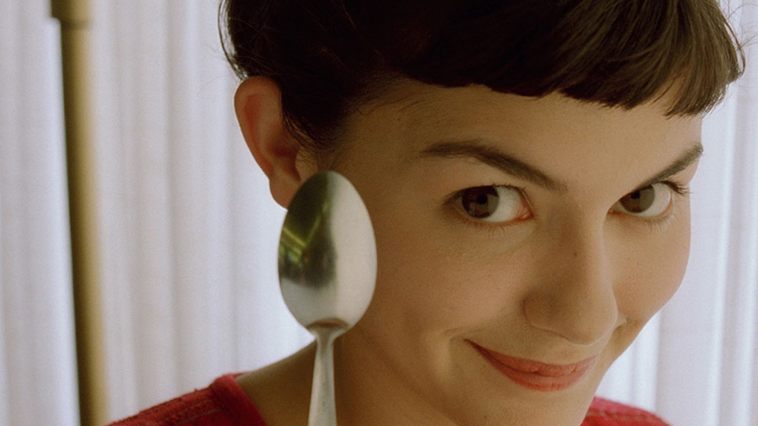
Amélie
2001, R, 122 min. Directed by Jean-Pierre Jeunet. Starring Audrey Tautou, Mathieu Kassovitz, Rufus, Yolande Moreau, Artus de Penguern, Dominique Pinon, Serge Merlin, Isabelle Nanty, Jamel Debbouze.
REVIEWED By Kimberley Jones, Fri., Nov. 16, 2001
An unseen narrator rattles off lists of the likes and dislikes of the characters in Amélie: A writer in a restaurant likes to watch bullfighters gored on television; Mme. Poulain dislikes her fingers pruning up in the bathtub. It’s a wonderful tactic on the part of co-writer/director Jeunet: reductive, maybe, but mostly revealing, cleverly accomplishing in lists of three what usually takes 10 minutes of awkward exposition.
High on the list of favorite things for Amélie (Tautou) – a twentysomething lonely hearts waitress in Montmarte – is the joy of watching the audience in a crowded movie theatre: their smiling eyes and little squeezes to the knee of a loved one as they take in Jules et Jim. It’s a fitting moment, early on in the film: Jeunet’s romanticized version of Paris is a throwback to Truffaut’s – the Montmarte of The 400 Blows, a place that exists only in sentimental minds, with an accordion creaking happily in the background. But it’s also right-on in that if you happen to steal a glance at your seatmates while watching Amélie, you’re bound to find the same smiling eyes and little love pats. Amélie is a film that wants you to get happy.
The plot is as thin as rice paper, about a woman who lives mostly in solitude, kept company by her far-reaching imagination. She decides one day, the day of Princess Di’s death, to try to affect small but meaningful changes in the lives of those around her, like reconnecting an aging man to his childhood and exciting two depressives into a love affair. It sounds sweet, and it is, but it isn’t Pay It Forward, the French Way. Amélie is sly in her machinations, and not unwilling to take a wicked comeuppance on those she thinks deserving. Amélie’s maneuverings are a little like playing God, but she’s manifest in such an angelic form that her meddling doesn’t seem so wrong-headed.
As our heroine, Tautou is an elfin charmer (comparisons to the original gamine, Audrey Hepburn, are flying off the shelf). The moral of her story is delivered with a bit of a heavy hand – that Amélie is too cowardly to open herself up to love in the same way she has pushed others; a similarly dreamy stranger named Nino, played by L’Haine director Matthieu Kassovitz, is meant to be her ticket to salvation. But Tautou’s grace in delivery and ability to connect with the audience overrides the obviousness of the message. Her most winning trait is the expressiveness of her face – a teasing smile and enormous eyes, alternately delighted then doleful. She isn’t alone; Jeunet has packed his precious universe with faces that articulate way beyond words, and he frames those faces beautifully, every shot filled to bursting with color and texture, all of which is obsessively put together. Sure, he’s given to stylistic excess in creating this alternate universe, but no less so than with his darker trips to otherworldly/underworldly places with two-time collaborator Marc Caro (Delicatessen, City of Lost Children).
A minor backlash has mobilized against Amélie, already a box-office tsunami back home in France. Critics fault the film for being too slight, too fanciful, too moony in its depiction of Paris, where even gutter rain looks gorgeous. It’s a nonsensical argument, like taking issue with an éclair for being too decadent or the cancan for coming off too frivolous. (A more legitimate attack is that Jeunet’s world is almost entirely devoid of people of color, an odd omission which doesn’t do justice to Paris’ diversity.) But to reproach a film for going for sweet, not sour grapes, is a bewildering protest. Why not get happy? Why not celebrate love, and little twists of fate, and a sepia-in-Technicolor portrait of Paris? Amélie’s heart is in the right place – squarely on its sleeve. And what better place for it?
A note to readers: Bold and uncensored, The Austin Chronicle has been Austin’s independent news source for over 40 years, expressing the community’s political and environmental concerns and supporting its active cultural scene. Now more than ever, we need your support to continue supplying Austin with independent, free press. If real news is important to you, please consider making a donation of $5, $10 or whatever you can afford, to help keep our journalism on stands.
Marc Savlov, June 25, 2010
Marjorie Baumgarten, June 25, 2010
Kimberley Jones, Dec. 24, 2004
May 10, 2024
May 10, 2024
Amélie, Jean-Pierre Jeunet, Audrey Tautou, Mathieu Kassovitz, Rufus, Yolande Moreau, Artus de Penguern, Dominique Pinon, Serge Merlin, Isabelle Nanty, Jamel Debbouze










